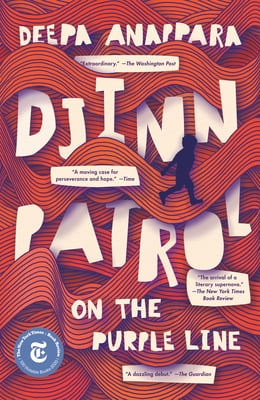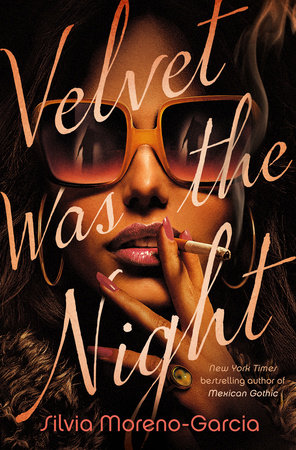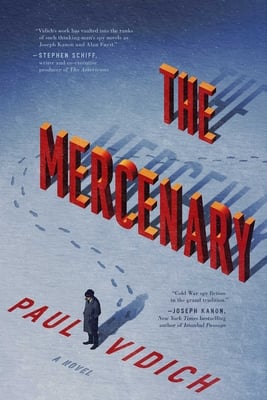International Crime: Deepa Anappara, Silvia Moreno-Garcia, and Paul Vidich
Questions (and Answers) From the Kimpton Hotels Book Club and Lending Program
In a partnership with Kimpton Hotels & Restaurants Lit Hub is curating a book club and lending program for travelers based on seasonal themes. Our fall reading list, International Crime, takes you on a journey around the world with three of the best international crime novels this year: Velvet Was the Night by Silvia Moreno-Garcia, The Mercenary by Paul Vidich, and Djinn Patrol on the Purple Line by Deepa Anappara.
*
Deepa Anappara, Djinn Patrol on the Purple Line

Where do you find you get the most writing done? Do you have any favorite writing locations?
I like to write in libraries and coffee shops. During the pandemic I have been writing at home. Any place where I can look out of the window is a great writing location for me.
How do you tackle writers block?
Research helps and so does thinking more about the spaces the characters occupy, and their motivations.
Which book(s) do you return to again and again?
I return often to Michael Ondaatje’s novels such as In the Skin of a Lion.
Your book is set in India. Describe why you chose this location and why it’s an important backdrop for the plot of your book?
I was born in India and worked as a journalist there. Djinn Patrol on the Purple Line is based on the real-life disappearances of children in India from impoverished neighborhoods. I couldn’t have written this novel if I had not worked as a reporter in these neighborhoods. The residents were kind, generous with their time, and shared their stories with me, which helped shape this novel. These stories are not part of the mainstream discourse, even in India, and therefore I was interested in exploring the experiences of children through fiction.
How has your work as a journalist influenced the novel, and how seamless was the transition from the interpretation from real-life events to a work of fiction?
It took me a long time to figure out how to tell this story. This was in part because of the ethical questions around my responsibility as a writer, as the novel portrays a marginalized, vulnerable community. I had to ask myself if I had the authority to narrate this story, and how I could be certain that my portrayal wouldn’t stereotype or patronize members of this community. My journalism helped in that it served as my research. The work I had done as a journalist gave me an insight into all aspects of the disappearances of children: the failure of politicians and institutions such as the police and the judiciary, the indifference of the society at large towards the problems of those who are marginalized, and the experiences of the children themselves. The children in the novel are composites of the children I had interviewed as a reporter.
But there were challenges in writing fiction—I had to learn to let go of facts and trust my imagination. I found a way to narrate this story once I had the voice of Jai, the main narrator who is nine. Inhabiting his perspective made it possible for me to focus solely on his interests. His innocence helped temper the harsh edges of his world.
What are some places you’re dying to visit and haven’t yet? When you land in a new city, what’s the first thing you seek out?
There are too many to list, but I would love to visit/revisit countries in East Asia such as South Korea and Japan. Museums tend to be one of the first places I visit in any new city.
*
Silvia Moreno-Garcia, Velvet Was the Night

What time of day do you write (and why)?
At nights, after I get back from work. I’ve always had a dayjob and have raised a family at the same time, so nights after the others went to bed worked best for me.
Which non-literary piece of culture—film, tv show, painting, song—could you not imagine your life without?
Old, cheap, black and white horror movies. There are some that are works of art. Cat People, for example. And there are others that are not so good, they’re just plain silly, but I still had a blast watching them. Films like The Tingler, for example. I spent my whole childhood glued to the TV set watching films.
Name a classic you feel guilty about never having read (why)?
There are a lot of books I haven’t read and would like to get to, but I don’t necessarily feel guilty about it. For the longest time I didn’t read Moby-Dick until I started reading a twitter bot that puts up quotes from the book and it inspired me to read it. I loved it. I don’t own a lot of physical books because shelves are not plentiful at my home, space being what it is, but I own many electronic books and I will never run out of reading material. But there’s no guilt in not reading them. Part of the pleasure of owning books is also letting them sit around until the fancy strikes you. The only time I feel guilty is when someone sends a book for blurbing or for review and I can’t get to it. There are only so many hours in a day, sadly.
How has your personal history with Mexico City affected the story of your novel, set in 1970s Mexico City? Describe why you chose this location and why it’s an important backdrop for the plot of your book?
Velvet Was the Night is inspired by a real incident. In 1971, the Mexican government had organized a secret paramilitary group, with backing from the CIA, to squash any communist activity in the country. Members of this group attacked and killed students who were peacefully marching down the streets one day in June. This is how the book opens, with that massacre. There’s no novel without that political background; it’s a noir embedded in a time and place.
What are some places you’re dying to visit and haven’t yet? When you land in a new city, what’s the first thing you seek out?
I’ve never been to England and had originally planned to stop there last year, but then COVID struck. I wanted to say hi to Lavie Tidhar, who is a fellow writer and one of my best friends. I’m a very boring person and usually I just want to eat and nap after a flight, not necessarily in that order. I would also like to go to the Caribbean one day. I’m fascinated by islands. In terms of land-locked places, I want to see Germany and Brussels. And I once saw a postcard from Ireland and it was just hills, hills, hills. I was born in a desert so I’m always curious about places that are very green. Would it be very hilly? Do people really have sheep there? We see the world through the lens of media, so for all I know someone painted that backdrop of hills and the sheep in the postcard were dogs in wool suits. Oh, and I want to go to the Telluride Mushroom Festival in Colorado. For the mushrooms, you see.
*
Paul Vidich, The Mercenary

Where do you find you get the most writing done? Do you have any favorite writing locations?
I write for four or five hours every morning sitting at our dining table, which is at one end of long room. The NYC city street outside our second-floor loft is quiet at that time of day and I am able to slip away from a room’s familiar setting into the uncertain dimension of my imagination.
Which book(s) do you return to again and again?
Within arm’s reach of my writing desk are Eric Ambler’s A Coffin For Dimitrios, an atmospheric meditation on corrupt human nature that is disguised as a crime novel; Charlotte Brontë’s Wuthering Heights, a family saga told with a complex story structure; Graham Greene’s The Third Man, a deceptively thin novel that is a masterpiece of noir fiction; le Carré’s A Spy Who Came in from the Cold, a superbly written literary spy novel that is, despite its celebrity, underrated in my opinion, and F. Scott Fitzgerald’s The Great Gatsby, which uses time masterfully and sentence-for-sentence may be best novel written in English in the twentieth century.
What’s the best writing advice you’ve ever received?
I rarely get good writing advice, but from time to time I have come across something another writer has written about writing that sticks with me. Isaac Bashevis Singer, a brilliant storyteller not as widely read as he should be, wrote that the writer’s obligation is the entertain and to instruct. By this, he meant that a writer needs to get the reader’s attention, and to keep it long after the reader has put down the book.
What research did you do into 1980s Moscow, a time where the Soviet Union was within chaos and the last stages of communism? Are there any similarities to today?
In my previous books, I visited the novel’s setting, but the pandemic prohibited on-site research for The Mercenary. I discovered, however, that Google map’s street view allowed me to roam the city as if I were there. I was able see where the action of the novel took place, walk the streets my characters traveled from their hotel. I was also able to look inside buildings and churches. Google street view allowed me to do “location scouting” from my home in Soho, New York. Street names, traffic patterns, pedestrian’s clothing, and building facades all come alive via my computer screen.
As part of my research, I read autobiographies of high-ranking KGB officers who successfully defected to the West. Their stories are gripping real-life accounts and they paint a graphic picture of the paranoia, incompetence, intrigues and sheer nastiness of the KGB. I was able to understand the hopes and fears of men who were caught in the Soviet system, and once I inhabited their world, I created Alek Garin, a Soviet double agent, born in Russia and raised in America as the son an illegal who was pushed by his loyal KGB mother to work in the CIA as a Soviet mole.
Dialogue is key for me. I listened to the voices of the of the Russian spies who autobiographies I read. It is easy to describe a character, but most descriptions don’t leave the reader with the faintest idea of who the character is. But if a character opens his mouth and says something, you reveal him in two or three lines. As I did my research, I picked up phrases, speech, and the particular syntax of these men.
In addition to memoirs of KGB defectors, I read as much as I could to understand the Soviet Union in 1985. The Afghan War had been raging for several years and the Soviet occupation had become deeply unpopular and depleted the Soviet economy. Serge Schmemann’s Echoes of a Native Land, a New York Times correspondent’s memoir of living in Moscow, provided a stark and moving account of the city in the 1980s that was infinitely suggestive. Details of the historical moment helped shaped the tone of the novel, and became background for several of the characters. There is little similarity between Russia today with its Putin-sponsored capitalism, and the Soviet Union in 1985, when it was a crumbling example of Communism.
Describe why you chose this location and why it’s an important backdrop for the plot of your book?
The book is about the exfiltration of a high-level KGB officer from Moscow in 1985, at the end of the Soviet Union. It was a grim city and for Americans living there, a denied zone full of surveillance. My choice of the story line established the novel’s setting—and I usually start a novel by picking a setting—and then find the characters. Setting is not just scenery, or nice descriptive passages, although an illustrator’s eye for a place is part of it. It’s about mood, it’s about the things that draw a character to a place, establishes the novel’s atmosphere, and evoke the story’s imaginary world.
The United States and the Soviet Union were locked into a Cold War arms race in 1985, and the exfiltration of a KGB officer with military secrets was an intelligence coup, if it could be pulled off. Against this backdrop, I developed several personal stories that are at the heart of the novel.
Viktor Petrov, a KGB Lieutenant Colonel with military secrets to sell, wanted to defect to the West. He lived in a specific apartment block, drank too much, spoke with a provincial accent, and cared deeply for his son. I created him, as all writers create characters, by accessing my own emotions and psyche, combining them with the real-life accounts of the KGB officers, and then I scraped all this material into a mental space, breathed on the ember, and gave life to Petrov. Alex Garin, the American spy who exfiltrates Petrov, is a former KGB officer who defected to the American side. As the date for Petrov’s exfiltration nears, Garin begins a relationship with a Russian agent and sets into motion a plan that might compromise everything. The novel explores the tension between state secrets and personal lives; between loyalty and deceit.
What are some places you’re dying to visit and haven’t yet? When you land in a new city, what’s the first thing you seek out?
Beirut is at the top of my list. My next novel is set there in 2006, but the Beirut I would really like to visit the Beirut of the 1950s and 1960s, namely the Beirut lived in by Kim Philby, the MI6 spy who was a Soviet mole and perhaps the most famous traitor of the twentieth century. Beirut then was a crossroads of intrigue and it remains an enduring legend, and like much of what we attach to the past, is built on fantasy. Philby, who lived there for six years, contributed to the city’s legend as a magnet for spies and conspirators of all stripes, helping to sustain its identity as a romantic place of international intrigue. It’s mostly gone now.
The long civil war and aggressive development has changed the face of Beirut, but the ghosts of that time can be found in places that survive—the building on Rue Kantari where he lived with his second wife, Eleanor Brewer, who had been married to the New York Times Beirut correspondent, before Philby charmed her into his bed. There is the old British embassy and Joe’s Bar nearby where Philby often drank, and the Bashoura cemetery where his father is buried.
Upon arrival in Beirut, I would go straight to the bar at the St. George Hotel and order Kim Philby’s drink, a gin martini, olives, no ice. Philby spent his last night in Beirut at the St. George bar on January 23, 1963, before skipping a dinner party and defecting to Moscow on a Russian trawler docked in Beirut harbor. I would like to get close to Philby’s Beirut, hoping that the beautiful ruins, broken buildings, and transformed neighborhoods evoke a reverie for the lost time of his last days when the net was closing in and he scrambled to escape.




















